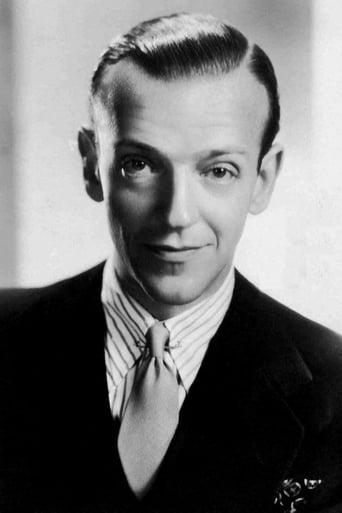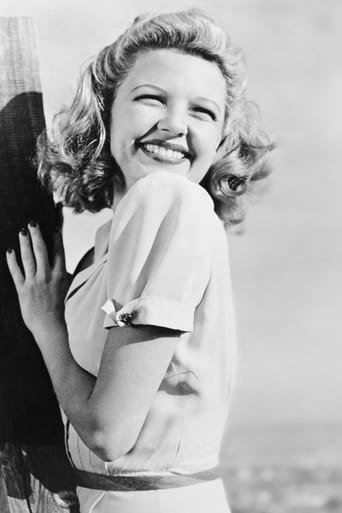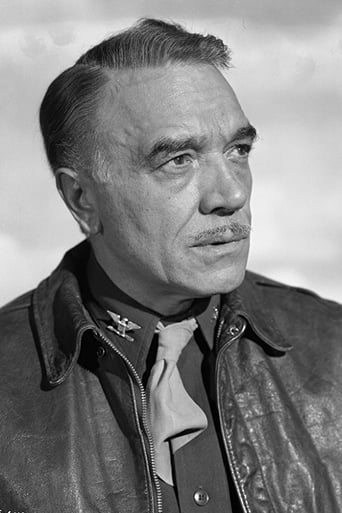Charles Herold (cherold)
There are some terrific songs in Holiday Inn, and some wonderful dance numbers. So good, in fact, that it's easy to just ignore how terrible the story is.The truth is, Astaire and Crosby play remarkably unsavory characters. While supposedly friends, Astaire thinks nothing of stealing Crosby's fiancé at the beginning of the play, and later tries to take his subsequent girlfriend. Meanwhile Crosby shows his love through a series of tricks and manipulations designed to make sure his girl will never experience any success outside of what he bestows on her.While you can argue, as some do, that the black-face sequences didn't seem nearly as creepy then as now, even Crosby's girl objects to his behavior during the film, and I don't think there was really any time when it was considered okay to steal someone's fiancé.To make it weirder, there is little indication that either of them were more than mildly attached to either girl. Crosby's response to being jilted is a simple "oh well," and he seems to forgive Astaire quite promptly. Astaire seems to go after Crosby's women less because he likes them than because they're there.Really, these are terrible, terrible people. And if there terribleness wasn't commented on at the time, it was not because it was considered acceptable behavior, but because the lead's personal charm and talent and Irving Berlin's classic songs seemed far more important than a typically inconsequential musical plot.
Catharina_Sweden
I thought this movie was a bit long and slow, and I could not really relate to the intrigues of the show business people, or their love affairs. Although the ending was sweet...Some aspects of it felt very dated, such as the "black face" number, the black, fat mommy with a heart of gold and a lot of common sense, working as a housekeeper, the war-time propaganda, etc. etc.. But of course you can look at it as a period drama - and I love the elegance of the 40:s, when women could still dress like ladies and men like gentlemen! The song and dance numbers are wonderful. Well, they have to be with Bing Crosby as the lead singer and Fred Astaire as the lead dancer! :-) There are also wonderful stage sets and decorations for the various holidays depicted.I think the movie was worth watching once in it's entirety, but in future I will probably just skim it for the best singing and dancing performances.
weezeralfalfa
The MGM musical is said to have peaked in the early '50s. but my favorite show biz-themed musicals were released in '41 and '42, with Fox's "Sun Valley Serenade" and Paramount's "Holiday Inn", respectively. They both feature snow and riding in sleighs, which adds to their charm. There's lots of humor in both, especially this one. Unfortunately, both were shot in B&W by their miserly studios. It's particularly galling that Paramount filmed the forgotten "Dixie", reuniting stars Bing Crosby and Marjorie Reynolds, in color, but chose B&W for an obvious classic film! Now that the present film has been released in a colorized version, it can more legitimately be compared with later color films, such as "Singing in the Rain". It's far more interesting than the second pairing of Crosby and Astaire, a few years later, in "Blue Skies". In addition to a better selection of songs and sets, and a much better comedic interaction between the male stars, their female costars in Marjorie Reynolds and Virginia Dale were much more appealing than Joan Caulfield, in the latter film. Marjorie is my favorite dance partner for Fred, if not the most technically proficient.Berlin was infamous for recycling his better songs in subsequent films. For this film, only 3 songs were previously composed, and probably only one of those: "Easter Parade", had been sung in a film(Fox's "Alexander's Ragtime Band"), and would serve as the title song in a third film, 6 years later. Bing's rendition, while driving Marjorie in a horse and buggy,with beautiful fruit tree blossoms in the background, is my favorite of these 3. "Lazy", which Bing sings when he is contemplating an easy life, 'retiring' to run a farm, would later be redone by Marilyn Monroe, in a very different(sexy) style! Even the seemingly specialized, though good, song "Abraham" was recycled in "White Christmas", along with the title song.In addition to "White Christmas", "Happy Holidays" is still a standard of the winter holiday season. The former is featured twice: once not far into the film, and again, just prior to the finale. Both renditions are essentially private affairs between Bing's and Marjorie's characters, who alternate in its singing. The first occurs in a very romantic setting of an isolated farm house, with a cozy fire, and it's snowing. The second involves Marge singing it on a Hollywood set, with a surprise appearance of an unseen Bing chiming in, come to reclaim her as his runaway girlfriend(She was furious because he first hid her from Fred, who wanted her for a dance partner, then from a Hollywood agent who wanted her and Fred for Hollywood stardom).The long "Abraham" performance was done in blackface by Bing and Marjorie, along with the orchestra, dancers and waiters, with Lincoln's freeing of the slaves as the theme. Noted African American actress Louise Beavers, as Bing's maid, and her two children, sing a small part. Bing's understood plot reason for doing this in blackface was to make Marjorie unrecognizable to the snooping Fred and his business partner, Danny, who are hooked on her as Fred's potential new dance partner. They don't know her name or where to find her, since Fred was very drunk when he danced with her at Danny's Christmas party, having just lost his former girlfriend and dance partner, played by the lovely Virginia Dale, to a Texas millionaire. Ironically, Ms. Dale left Fred because of a mere jealousy spat over an unseen Marjorie, whom he hadn't even yet met and was connected with by a misunderstanding(Yes, "The lady must have been willing", as Fred would later quip when Margie suddenly abandoned Fred for Bing, at the end).Fred's unique 'firecracker dance' for the July 4 show reportedly needed 38 takes to get the synchrony between the explosions and his dancing just right!. Marjorie isn't in this show, due to Bing's dastardly trick to keep her away from Hollywood scouts. She and Fred, nonetheless, become a Hollywood sensation. Thus, Bing spends Thanksgiving alone(except for his maid), his inn closed, just playing his record "I've Got Plenty to be Thankful For", with sarcastic remarks. Thanks to a sound scolding by Ms. Beavers, he goes to Hollywood to try to win back Marjorie. It didn't take much, as I previously detailed. Yes, the women were fickle.Among the many musical highlights, I should mention the "I'll Capture your Heart Singing/Dancing", "You're Easy to Dance With" and finale-modified reprisal of these, with the 4 stars reunited. Bing and Marjorie's alternating singing of "Come to Holiday Inn", with Marjorie in a sparkling gold evening gown, is great. But, perhaps my favorite is Fred and Marjorie dancing to "Be Careful, It's My Heart", while Bing sings it at the piano, unaware of Fred's presence, briefly reprised in their Hollywood montage.....I give it 20 stars.









